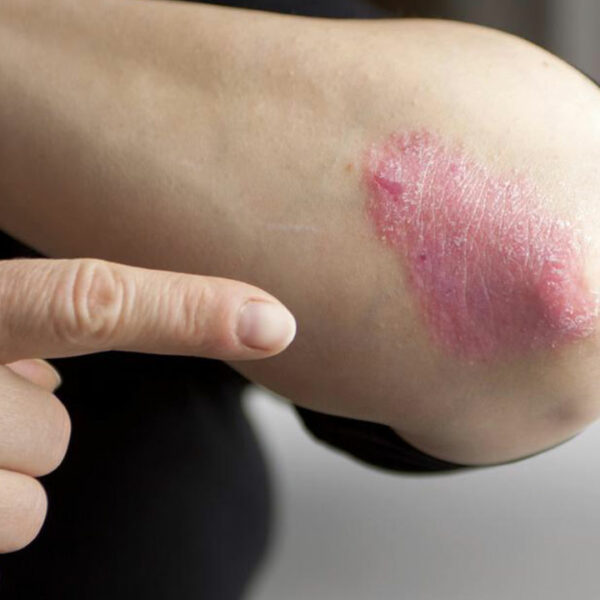Here Are a Few Things to Know about Psoriasis
Psoriasis occurs when your immune system is too weak. It is a disease of the skin that is unfortunately chronic. Psoriasis is an autoimmune disease where the skin cells multiply at an uncontrollable rate. It results in scaling and flaky skin. The disease has no cure and will occur multiple times during one’s lifetime. It mostly starts as a person enters adulthood. The scaly and flaky skin usually occurs on the knees, scalp, and elbows.

Causes of psoriasis
There is no particular reason for the occurrence of psoriasis. Some common causes of psoriasis include genetic disposition and environmental factors. If psoriasis runs in your family, then there are high chances that you will also develop this disease. A compromised immune system is also one of the major causes of psoriasis.
Gene theory
One-third of the people who have psoriasis have a relative who has the same disease. However only 2-3% of the people who have a gene which causes psoriasis report of suffering from the disease. Over 10% of the American population carries one or more of these genes.
Environmental factors
While the gene for psoriasis may be present in many, only a few suffer from this disease. Environmental factors play a large role in triggering these genes, which makes the disease ‘active.’
Some of the triggers that are also causes of psoriasis include the following:
- Cold weather accompanied with dryness. This type of weather will dry up your skin, prompting a flare-up of psoriasis.
- Many patients have reported that a flare-up usually occurs due to stress they might be experiencing. Paradoxically, having psoriasis itself can be a cause of stress.
- Infections like strep throat and tonsillitis can result in a flare-up of a particular type of psoriasis.
- Some medicines can act as a trigger for psoriasis genes. These medicines include lithium, some beta-blockers, and drugs for malaria.
- Skin trauma such as burns, cuts, tattoos, and vaccinations can result in psoriasis occurring at the site of injury.
- Alcohol and smoking have been proved to aggravate the symptoms of psoriasis.
Immune system
In psoriasis, your body’s defense system mistakenly identifies the healthy cells as infections and begins to attack them. The disease causes an excessive growth of skin cells. These cells get pushed up to the surface which is what you see as scaly, flaky skin. Since your skin cannot shed all the excess skin at a rate that it needs to, the cells build up on the surface. Due to the infection, the immune system is on an overdrive which causes inflammation.
Treatment of psoriasis
There is no cure for psoriasis or any way to avoid the causes of psoriasis. The best you can do is to treat the appearance of your skin. These are the different types of treatments for psoriasis.
- Topical treatment: Topical treatments are usually enough to treat mild to moderate instances of psoriasis. For severe cases, these are prescribed along with other medications. Most topical creams lose their effect over time. It is best used sparingly and for occasional flare-ups.
- Vitamin D : A cream containing vitamin D will go a long way in treating mild forms of psoriasis.
- Topical retinoids : Retinoids are derived from vitamin A and reduce inflammation. These cause sensitivity to sunlight. Thus, wear sunscreen when using retinoids. Pregnant women must consult with their doctors before using these creams.
- Salicylic acid : This topical cream helps to remove the extra skin and scaling. It is available in shampoos and conditioners that will help with any flare-up on the scalp.
- Moisturizers : While moisturizers won’t prevent any instances of psoriasis, they can help with the dryness and scaling. It is best used after a shower to lock-in moisture.
- Light therapy: Exposing your skin to controlled amounts of light has proven to be effective when combating psoriasis.
- Sunlight : Exposing yourself to small amounts of sunlight will slow down the rate of skin cell formation. However, prolonged exposure can lead to more damage. Consult with your doctor before trying this.
- UVB phototherapy : Using an artificial light source, your skin will be exposed to UVB light. This treatment is particularly useful for improving mild to moderate instances of the disease.
- Excimer laser : This treatment also uses UVB light albeit in a more controlled manner. The rays are directed to only the patches with psoriasis, thus leaving the healthy skin unaffected.
- Oral medication : Some types of medicines that are taken orally or via injections can help with instances of psoriasis.
- Retinoids: As mentioned earlier, this vitamin A derivative is a potent treatment for psoriasis. Pregnant and nursing women must avoid the oral form of retinoids.
- Cyclosporine: This drug will help by suppressing your immune system. It will reduce the inflammation and production of new skin cells.
Consult with your doctor and a dermatologist for a comprehensive treatment of psoriasis. There are many alternative medications you can consider such as fish oil, aloe vera, and Oregon grape.





